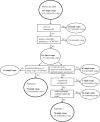Importance of pollinators in changing landscapes for world crops
- PMID: 17164193
- PMCID: PMC1702377
- DOI: 10.1098/rspb.2006.3721
Importance of pollinators in changing landscapes for world crops
Abstract
The extent of our reliance on animal pollination for world crop production for human food has not previously been evaluated and the previous estimates for countries or continents have seldom used primary data. In this review, we expand the previous estimates using novel primary data from 200 countries and found that fruit, vegetable or seed production from 87 of the leading global food crops is dependent upon animal pollination, while 28 crops do not rely upon animal pollination. However, global production volumes give a contrasting perspective, since 60% of global production comes from crops that do not depend on animal pollination, 35% from crops that depend on pollinators, and 5% are unevaluated. Using all crops traded on the world market and setting aside crops that are solely passively self-pollinated, wind-pollinated or parthenocarpic, we then evaluated the level of dependence on animal-mediated pollination for crops that are directly consumed by humans. We found that pollinators are essential for 13 crops, production is highly pollinator dependent for 30, moderately for 27, slightly for 21, unimportant for 7, and is of unknown significance for the remaining 9. We further evaluated whether local and landscape-wide management for natural pollination services could help to sustain crop diversity and production. Case studies for nine crops on four continents revealed that agricultural intensification jeopardizes wild bee communities and their stabilizing effect on pollination services at the landscape scale.
Figures




References
-
- Albrecht, M., Duelli, P., Müller, C. B., Kleijn, D. & Schmid, B. In press. Swiss agri-environment scheme enhances pollinator diversity and plant reproductive success in nearby intensively managed farmland. J. Appl. Ecol.
-
- Allen-Wardell G, et al. The potential consequences of pollinator declines on the conservation of biodiversity and stability of crop yields. Conserv. Biol. 1998;12:8–17. doi:10.1046/j.1523-1739.1998.97154.x - DOI
-
- Anonymous Audit de la filière miel août 2005. Abeille de France. 2005;919:479–496.
-
- Ashman T.L, et al. Pollen limitation of plant reproduction: ecological and evolutionary causes and consequences. Ecology. 2004;85:2408–2421.
-
- Banaszak J. Strategy for conservation of wild bees in an agricultural landscape. Agric. Ecosyst. Environ. 1992;40:179–192. doi:10.1016/0167-8809(92)90091-O - DOI
Publication types
MeSH terms
LinkOut - more resources
Full Text Sources
Other Literature Sources
